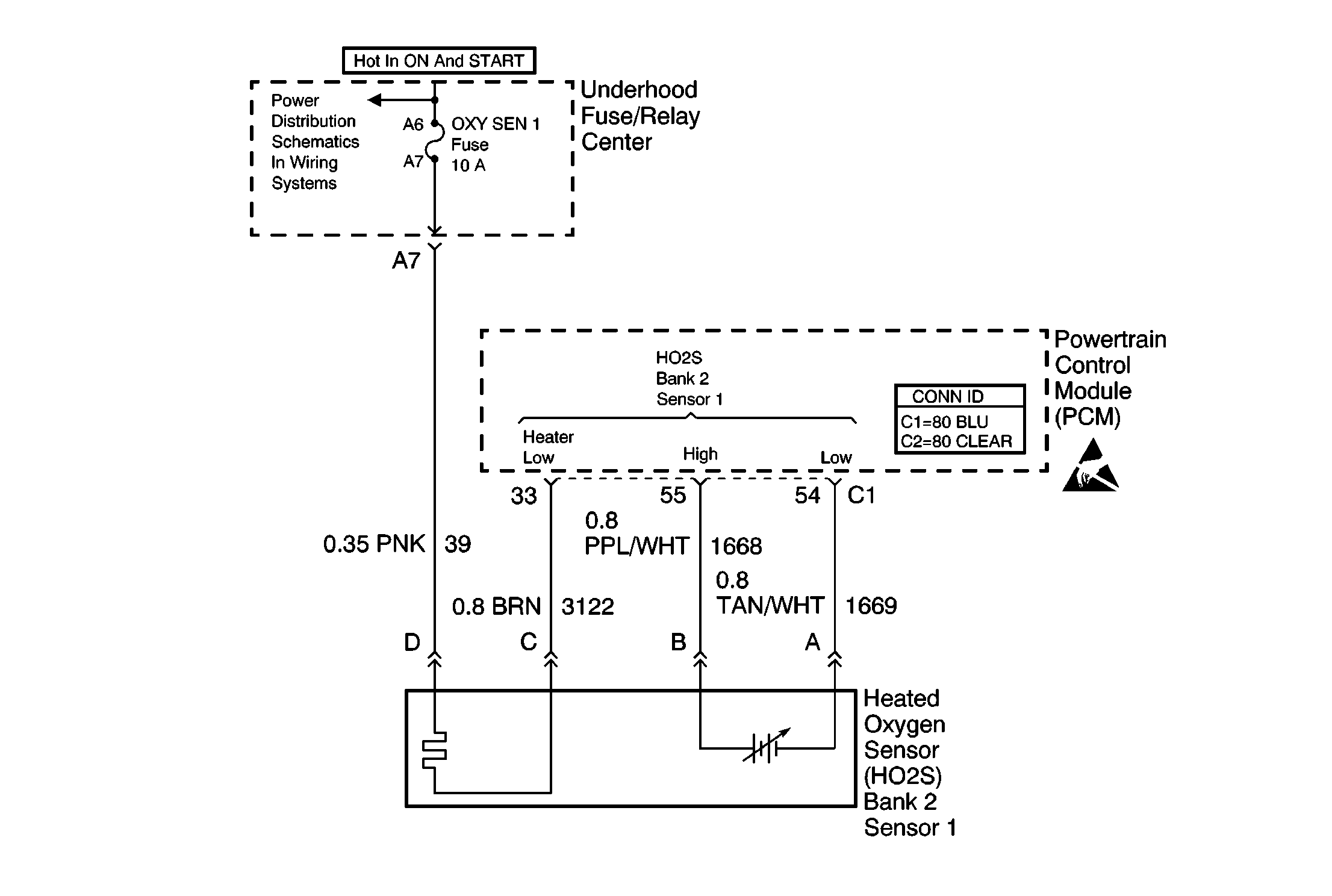
Circuit Description
The heated oxygen sensor (HO2S) is a sensor used to detect oxygen-content in the exhaust. The powertrain control module (PCM) supplies the sensor with a signal circuit and a ground circuit. The PCM supplies a bias voltage between the circuits. The sensor varies the voltage based on the oxygen content in the exhaust. When the exhaust stream is lean (more oxygen), the sensor produces a low voltage signal. When the exhaust stream is rich (less oxygen), the sensor produces a high voltage signal. The PCM monitors the HO2S signal during closed loop. To correct for rich or lean conditions, the PCM adjusts the injector pulse width. If the signal frequency of HO2S bank 2 sensor 1 indicates an active sensor (closed loop), but the amplitude (voltage) of the signal remains within a calibrated range, DTC P0150 will set.
Conditions for Running the DTC
| • | No TP sensor, MAF sensor, MAP sensor, ECT sensor, HO2S, or fuel injector DTCs are set. |
| • | ECT is more than 75°C (167°F). |
| • | Engine run time is more than 120 seconds (2 minutes). |
| • | Predicted O2 heater temperature is more than 600°C (1112°F) |
| • | System voltage is between 9-18 volts. |
| • | MAF is between 3-30 g/s. |
| • | Engine speed is between 500-5000 RPM. |
| • | Traction control is inactive |
| • | Catalyst test is inactive |
| • | Deceleration Fuel Cut Off (DFCO) is inactive. |
| • | Power Enrichment (PE) is inactive. |
| • | Conditions above met for 5 seconds. |
| • | Closed loop fuel control is enabled. |
Conditions for Setting the DTC
| • | The vehicle is in closed loop fuel control (based on HO2S bank 1 sensor 1 and bank 2 sensor 1 voltages switching from below 350 mV to above 500 mV). |
| • | During a 120 second monitoring period, the HO2S bank 2 sensor 1 voltage remains within 350-500 mV for approximately 16 seconds. |
Action Taken When the DTC Sets
| • | The PCM illuminates the malfunction indicator lamp (MIL) during the second consecutive trip in which the diagnostic test runs and fails. |
| • | The PCM stores the conditions present when the DTC set as Freeze Frame/Failure Records data. |
Conditions for Clearing the MIL/DTC
| • | The PCM will turn the MIL OFF after the third consecutive trip in which the diagnostic runs and passes. |
| • | The history DTC will clear after 40 consecutive warm-up cycles have occurred without a malfunction. |
| • | The DTC can be cleared by using the scan tool Clear DTC Information function. |
Diagnostic Aids
If the condition is intermittent, refer to Intermittent Conditions in Symptoms.
Step | Action | Values | Yes | No | ||||||
|---|---|---|---|---|---|---|---|---|---|---|
1 | Did you perform the Powertrain On Board Diagnostic (OBD) System Check? | -- | ||||||||
2 |
Does the scan tool indicate HO2S bank 2 sensor 1 voltage varying outside the specified values? | 350-500 mV | ||||||||
3 |
Does the scan tool indicate DTC failed last test? | -- | Go to Diagnostic Aids | |||||||
4 |
Does the scan tool indicate an HO2S bank 2 sensor 1 voltage below the specified value? | 150 mV | ||||||||
5 |
Did you find and correct the condition? | -- | ||||||||
6 |
Did you find and correct the condition? | -- | ||||||||
7 |
Important: If the sensor appears contaminated, correct the source of the oxygen
sensor contamination before replacing the sensor in order to prevent future
contamination. Typical contamination sources include the following:
Replace HO2S bank 2 sensor 1. Refer to Heated Oxygen Sensor Replacement - Bank 2 . Is the action complete? | -- | -- | |||||||
8 |
Important:: The replacement PCM must be programmed. Replace the PCM. Refer to Powertrain Control Module Replacement/Programming . Is the action complete? | -- | -- | |||||||
9 |
Does the scan tool indicate DTC P0150 passed? | -- | System OK |
